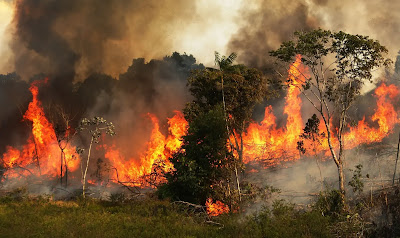The photograph above accompanied an opinion column that appeared in the March 26, 2024, edition of The Mercury News. The column raised concerns about a set of California policies intended to help combat global warming. The column was titled, "How a California climate win could end up destroying rainforests," and the subheading on the column says that California's rapidly growing use of renewable diesel from crops "threatens to hurt the environment more than it helps."
Here's the argument, as outlined by Colin Murphy and Daniel Sperling:
Half the diesel fuel in California is made not from unsustainable petroleum but from renewable biomass such as waste and plant oils. Soon all our diesel will be biofuels. This is particularly good for the environment if the fuel is made from wastes and residues, but it’s much less so if it’s made from crops that use energy and land but don’t produce food.
Unfortunately, a proposed amendment to California’s Low Carbon Fuel Standard threatens to put the state, the country and the world on a course toward relying more heavily on diesel produced from crops, ensuring more widespread destruction of rainforests and diversion of farmland from food to energy production....
As the industry grows, it’s having some unintended consequences. Until recently, most renewable diesel was made from waste cooking oil, rendered beef fat and corn-ethanol byproducts. But now those domestic sources of waste oil are largely tapped out. Indeed, the U.S. has to import not only waste-based fuels but also the wastes and residues themselves to supply our processors.
That means more and more renewable diesel is likely to come from oil produced from soybeans and other food crops. We know from experience that increasing demand for plant-based oils — whether for food, animal feed or biofuels — leads to more slashing and burning of tropical rainforests in Southeast Asia and South America to expand palm and soy oil production. This deforestation releases mass quantities of greenhouse gases by burning trees that have sequestered carbon over centuries. It also harms watersheds, disrupts Indigenous communities and causes a raft of other social and environmental problems.
The Murphy-Sperling column invites us to reflect on the phenomenon of "unintended consequences," but it also made me think of the statement, "Less is More." This statement is often employed as a way to highlight the need to make environmental sustainability a priority. Click this link to learn about a book with the "Less is More" title.
Well-intentioned as the "Less is More" admonition might be, there is a problem with that phrasing. The problem is the "More" part. When we think about the various solutions advanced to deal with the global warming that is now challenging life on this planet (including our own lives, and I am not exaggerating), I think it is fair to conclude that the efforts we are making almost always accept the premise that we will, and should, continue to "grow," to increase our economic and other activity - but that we should do that in a way that will reduce the global warming dangers we face. The "renewable diesel" idea is a good example.
In fact, it seems to me, it is a kind of wishful thinking to believe that we can reduce global warming emissions as we continue on our current growth and development path. I think we need to scrap the "Less is More" concept.
What should replace it? You are probably already poised to hear my response:
LESS
I think that's a message that Donella Meadows would approve, and I'm with Donella:
Image Credits:
(2) - David Thierman Facebook Page, https://www.facebook.com/dthiermann, March 26, 2024



Yes, less people! Less driving, less flying off to exotic places for climate conferences that lead nowhere, less buying anything newly manufactured. Less buying processed food and food shipped from thousands of miles away. We could possibly keep the global warming from frying us for a while longer if we all practiced Less is More.
ReplyDelete